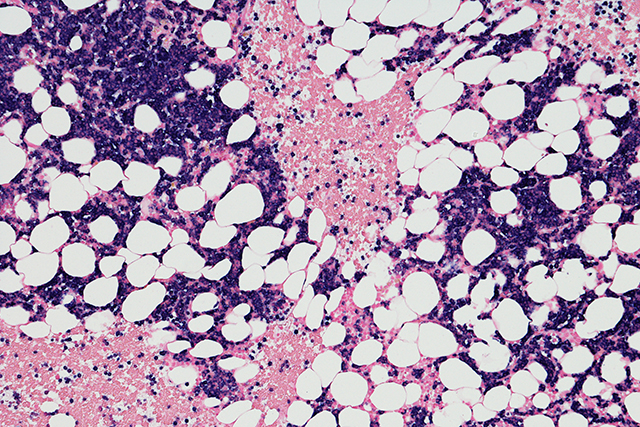Cancer and neoplasms
Germline Predisposition to Myeloid Neoplasms Seen in Adults With Bone Marrow Hypocellularity
Germline genetic predisposition to myeloid neoplasms contributes to cytopenias and hypoplastic bone marrow (BM) in adult patients, and pathogenic/likely
pathogenic genetic variants are associated with a higher risk of severe cytopenias and advanced myeloid neoplasms in this population, according to research published in Blood.
Researchers evaluated the prevalence and phenotypic expressivity of germline variants predisposing to myeloid neoplasms and their clinical correlates in a cohort of adult patients with hypoplastic BM.
Continue Reading
They performed germline and somatic targeted sequencing of variants in 60 and 54 genes, respectively, in 402 consecutive adult patients with unexplained cytopenia and reduced age-adjusted BM cellularity (median age, 56 years; range, 18-86 years; 50.5% female).
The study demonstrated that 27 (6.7%) patients carried germline variants that cause (pathogenic/likely pathogenic genetic variants) a predisposition syndrome/disorder, most frequently DDX41-associated predisposition (n=12), Fanconi anemia (n=4), GATA2-deficiency syndrome (n=3), severe congenital neutropenia (n=2), RASopathy (n=2), and Diamond-Blackfan anemia (n=2). Of these 27 patients, 18 (67%) patients were diagnosed with myeloid neoplasm, whereas 9 (33%) patients had cytopenia of undetermined significance.
Further analysis showed that patients with versus those without a predisposition syndrome/disorder were younger (median age, 51 vs 57 years; P=.03) and had a higher risk of neutropenia (odds ratio [OR], 3.51; P=.014), moderate-to-severe neutropenia (OR, 3.51; P=.002), multiple cytopenias (OR, 3.63; P=.002), more severe cytopenia (OR, 2.51; P =.03) and advanced myeloid malignancy (OR, 5.58; P<.001), and greater prevalence of extrahematologic comorbidities (OR, 2.96; P=.037).
No significant association of a predisposition syndrome/disorder was observed with a family or personal history of cancer. In patients with myeloid neoplasm, causative germline mutations were associated with increased risk of progression to acute myeloid leukemia (hazard ratio, 3.92; P =.008).
“Identifying an underlying [germline] genetic predisposition has relevant clinical implications, because patients with myeloid neoplasm carrying predisposition variants show more severe disease and increased risk of leukemic progression,” wrote the study authors. “These results also suggest that age-adjusted hypocellularity may represent an indication for [germline] genetic testing in adults, although facing a spectrum of disorders and variants with incomplete penetrance and/or mild clinical expressivity complicates the development of clinically informed strategies for genetic testing.”
Disclosure: One study author declared affiliations with biotech, pharmaceutical, and/or device companies. Please see the original reference for a full list of authors’ disclosures.
Reference
Molteni E, Bono E, Gallì A, et al. Prevalence and clinical expression of germ line predisposition to myeloid neoplasms in adults with marrow hypocellularity. Blood. 2023;142(7):643-657. doi:10.1182/blood.2022019304

